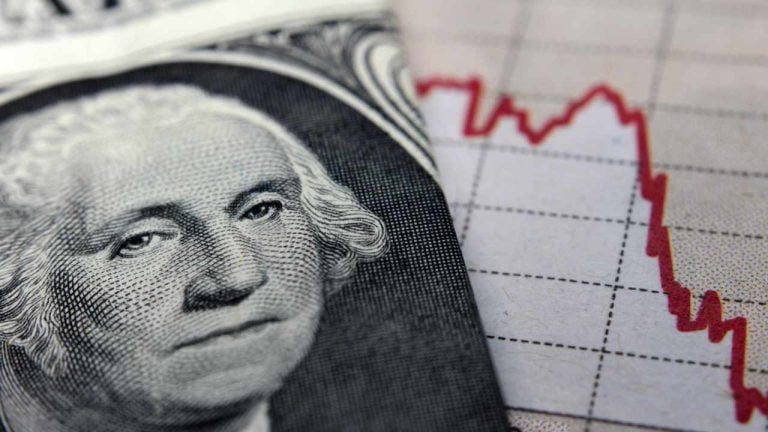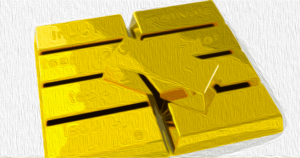
Leading worldwide financial entity Jefferies sounds the alarm on the precarious state of the U.S. dollar paper standard, forecasting an outcome that could significantly profit both gold bullion and bitcoin enthusiasts. The expected continued commitment of G7 central banks, including the Federal Reserve, towards the augmentation of the central bank balance sheet in various forms, adds to the complexity of the situation.
Bitcoin's Potential Advantage Amidst U.S. Dollar Instability
Jefferies, a top-notch investment banking and capital market firm in the U.S. with international influence, forecasts potential fallouts for the U.S. dollar that could ultimately give a leg-up to investors in bitcoin. Spread across the Americas, Europe, Asia Pacific, and the Middle East, Jefferies offers comprehensive investment banking services that have garnered global distinction.
This financial titan recently released a notice to its investors in which Chris Wood, their Global Head of Equity Strategy, labelled both bitcoin and gold as "vital hedges", offering shield against the devaluing of currency and the dwindling yield from inflation. Owing to his impact and insight, Asiamoney bestowed upon Wood the title of Best Strategist in the Asia region in 2020.
Central Banks and the 'Debt Death Spiral'
Wood shed light on the Federal Reserve's tactics which include reducing its balance sheet and ramping up interest rates to unprecedented levels in a bid to counter rampant inflation. He anticipates that the U.S. may experience an unforeseen economic downturn, compelling the Federal Reserve to shift gears towards a more dovish approach as it wrestles with a colossal $33 trillion U.S. "debt death spiral."
Continuing, Wood cautioned investors: "The G7 central banks, with the Federal Reserve being key among them, will face challenges in the transition from unconventional monetary tactics and will inevitably choose to persist with the expansion of central bank balance-sheet in one form or another."
Gold Bullions and Bitcoins: An Insurance or Short-term Trades?
Wood's advice to investors is to treat their holdings in gold and bitcoin as a form of insurance rather than quick trade opportunities. Moreover, he encourages investors who operate with the U.S. dollar on the global platform over the long run, including pension funds, to direct 10% of their portfolio towards BTC.
Bitcoin: An Alternative Store of Value
The analyst's endorsement of bitcoin doesn't stop there. He advocates for its investability for institutional investors, citing the availability of custodian arrangements for digital assets, which establishes bitcoin as an alternative storage of value akin to gold.
The looming cracks in the U.S. dollar's foundation coupled with the potential strength of gold bullion and bitcoin presents an intriguing landscape for investors moving forward. What are your thoughts on this recent analysis by Jefferies? We'd love to hear your insights in the discussion below.
Frequently Asked Questions
What are the pros & cons of a Gold IRA?
An Individual Retirement Plan (IRA) has a major advantage over regular savings accounts. It doesn't tax any interest earned. An IRA is a great option for those who want to save money, but don't want tax on any interest earned. However, there are disadvantages to this type investment.
You may lose all your accumulated savings if you take too much out of your IRA. The IRS may prohibit you from withdrawing funds from your IRA before you are 59 1/2 years of age. A penalty fee will be charged if you decide to withdraw funds.
Another disadvantage is that you must pay fees to manage your IRA. Many banks charge between 0.5%-2.0% per year. Other providers charge monthly management charges ranging anywhere from $10 to $50.
You can purchase insurance if you want to keep your money out of a bank. Many insurers require that you own at least one ounce of gold before you can make a claim. You may be required by some insurers to purchase insurance that covers losses as high as $500,000.
If you decide to open a gold IRA, it is important to know how much you can use. You may be limited in the amount of gold you can have by some providers. Others allow you the freedom to choose your own weight.
You'll also need to decide whether to buy physical gold or futures contracts. Physical gold is more costly than gold futures. However, futures contracts give you flexibility when buying gold. They enable you to establish a contract with an expiration date.
You also need to decide the type and level of insurance coverage you want. Standard policies don't cover theft protection, loss due to fire, flood or earthquake. However, it does cover damage caused by natural disasters. Additional coverage may be necessary if you reside in high-risk areas.
In addition to insurance, you'll need to consider the cost of storing your gold. Storage costs are not covered by insurance. Safekeeping costs can be as high as $25-40 per month at most banks.
Before you can open a gold IRA you need to contact a qualified Custodian. A custodian helps you keep track of your investments, and ensures compliance with federal regulations. Custodians are not allowed to sell your assets. They must instead keep them for as long as you ask.
Once you have chosen the right type of IRA to suit your needs, it is time to fill out paperwork defining your goals. You must include information about what investments you would like to make (e.g. stocks, bonds and mutual funds). The plan should also include information about how much you are willing to invest each month.
After completing the forms, send them along with a check or a small deposit to your chosen provider. After reviewing your application, the company will send you a confirmation mail.
Consider consulting a financial advisor when opening a golden IRA. Financial planners have extensive knowledge in investing and can help determine the best type of IRA to suit your needs. They can also help you lower your expenses by finding cheaper alternatives to purchasing insurance.
Are You Ready to Invest in Gold?
This will depend on how much money and whether you were able to invest in gold at the time that you started saving. If you are unsure which option to choose, consider investing in both options.
You can earn potential returns on your investment of gold. This makes it a worthwhile choice for retirees.
Although most investments promise a fixed rate of return, gold is more volatile than others. This causes its value to fluctuate over time.
This does not mean you shouldn’t invest in gold. This just means you need to account for fluctuations in your overall portfolio.
Another benefit to gold is its tangible value. Gold can be stored more easily than stocks and bonds. It can be easily transported.
You can always access gold as long your place it safe. There are no storage charges for holding physical gold.
Investing in gold can help protect against inflation. It's a great way to hedge against rising prices, as gold prices tend to increase along with other commodities.
You'll also benefit from having a portion of your savings invested in something that isn't going down in value. Gold usually rises when the stock market falls.
Gold investment has another advantage: You can sell it anytime. You can easily liquidate your investment, just as with stocks. You don’t even need to wait until retirement to liquidate your position.
If you do decide to invest in gold, make sure to diversify your holdings. Do not put all your eggs in one basket.
Also, don't buy too much at once. Begin by buying a few grams. Continue adding more as necessary.
Remember, the goal here isn't to get rich quickly. Instead, the goal here is to build enough wealth to not need to rely upon Social Security benefits.
Even though gold is not the best investment, it could be an excellent addition to any retirement plan.
What tax is gold subject in an IRA
The fair market value of gold sold is the basis for tax. You don't pay taxes when you buy gold. It is not income. If you sell it later, you'll have a taxable gain if the price goes up.
You can use gold as collateral to secure loans. Lenders look for the highest return when you borrow against assets. Selling gold is usually the best option. It's not guaranteed that the lender will do it. They might keep it. Or, they may decide to resell the item themselves. Either way, you lose potential profit.
So to avoid losing money, you should only lend against your gold if you plan to use it as collateral. If you don't plan to use it as collateral, it is better to let it be.
Who is entitled to the gold in a IRA that holds gold?
The IRS considers any individual who holds gold “a form of income” that is subject to taxation.
You must have at least $10,000 in gold and keep it for at most five years to qualify for this tax-free status.
The purchase of gold can protect you from inflation and price volatility. But it's not smart to hold it if your only intention is to use it.
If you plan on selling the gold someday, you'll need to report its value, which could affect how much capital gains taxes you owe when you cash in your investments.
To find out what options you have, consult an accountant or financial planner.
Do you need to open a Precious Metal IRA
You should be aware that precious metals cannot be covered by insurance. There is no way to recover money that you have invested in precious metals. All your investments can be lost due to theft, fire or flood.
This type of loss can be avoided by investing in physical silver and gold coins. These items have been around thousands of years and are irreplaceable. If you were to sell them today, you would likely receive more than what you paid for them when they were first minted.
You should choose a reputable firm that offers competitive rates. You should also consider using a third party custodian to protect your assets and give you access at any time.
When you open an account, keep in mind that you won't receive any returns until your retirement. Remember the future.
What's the advantage of a Gold IRA?
There are many benefits to a gold IRA. It's an investment vehicle that lets you diversify your portfolio. You decide how much money is put in each account and when it is withdrawn.
You have the option of rolling over funds from other retirement account into a gold IRA. This allows you to easily transition if your retirement is early.
The best part is that you don't need special skills to invest in gold IRAs. They are readily available at most banks and brokerages. You don't have to worry about penalties or fees when withdrawing money.
That said, there are drawbacks too. The volatility of gold has been a hallmark of its history. Understanding why you want to invest in gold is essential. Is it for growth or safety? Is it for security or long-term planning? Only then will you be able make informed decisions.
If you are planning to keep your Gold IRA indefinitely you will want to purchase more than one ounce. A single ounce isn't enough to cover all of your needs. Depending on the purpose of your gold, you might need more than one ounce.
A small amount is sufficient if you plan to sell your gold. You can even live with just one ounce. These funds won't allow you to purchase anything else.
Statistics
- If you take distributions before hitting 59.5, you'll owe a 10% penalty on the amount withdrawn. (lendedu.com)
- Contribution limits$6,000 (49 and under) $7,000 (50 and up)$6,000 (49 and under) $7,000 (50 and up)$58,000 or 25% of your annual compensation (whichever is smaller) (lendedu.com)
- If you accidentally make an improper transaction, the IRS will disallow it and count it as a withdrawal, so you would owe income tax on the item's value and, if you are younger than 59 ½, an additional 10% early withdrawal penalty. (forbes.com)
- The price of gold jumped 131 percent from late 2007 to September 2011, when it hit a high of $1,921 an ounce, according to the World Gold Council. (aarp.org)
- This is a 15% margin that has shown no stable direction of growth but fluctuates seemingly at random. (smartasset.com)
External Links
wsj.com
- Saddam Hussein's InvasionHelped Uncage a Bear in 1990 – WSJ
- You want to keep gold in your IRA at home? It's Not Exactly Legal – WSJ
irs.gov
finance.yahoo.com
forbes.com
- Gold IRA – Add Sparkle to Your Retirement Nest Egg
- Understanding China's Evergrande Crisis – Forbes Advisor
How To
The History of Gold as an Asset
From ancient times to the beginning of the 20th century, gold was used as a currency. It was widely accepted around the world and enjoyed its purity, divisibility and uniformity. It was also traded internationally due to its high value. Different weights and measurements existed around the world, however, because there were not international standards to measure gold. For example, one pound sterling in England equals 24 carats; one livre tournois equals 25 carats; one mark equals 28 carats; and so on.
The United States started issuing American coins in the 1860s made of 90% copper and 10% zinc. This led to a decline in demand for foreign currencies, which caused their price to increase. In this period, large amounts of gold coin were minted by the United States, which caused the gold price to drop. The U.S. government was unable to pay its debts due to too much money being in circulation. They decided to return some of the gold they had left to Europe.
Many European countries didn't trust the U.S. dollars and started to accept gold for payment. Many European countries began to use paper money and stopped accepting gold as payment after World War I. The price of gold has risen significantly since then. Even though gold's price fluctuates, it is still one of the most secure investments you could make.
—————————————————————————————————————————————————————————————–
By: Kevin Helms
Title: Impending Consequences on the U.S. Dollar: A Boon for Gold and Bitcoin?
Sourced From: news.bitcoin.com/analyst-warns-of-us-dollar-collapse-predicts-bitcoin-owners-to-benefit/
Published Date: Tue, 10 Oct 2023 02:30:13 +0000
















